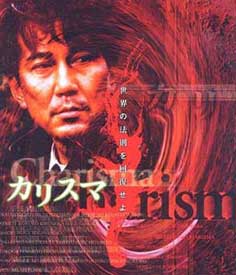Charisma has a fascinating central performance by Koji Yokusho from 1995's endearing Shall We Dance not to be confused with the repellant 2004 remake starring the repellant clodhopper Richard Gere, a sorry replacement in the role that Yokusho had played so brilliantly. But the film overall is such a vague symbolist work that it comes off as meaningless.
Kyoshi Kurosawa has a reputation among Asian horror afficionados for films like Doppelganger & Seance which are vastly more substantial than Charisma, the mysticism of which never adds up to much more than a tepid plaint for the environment.
Koji Yakushosho plays a police detective who attempted to save the life of both a madman & his hostage, resulting in the death of both men. He is criticized for not having just killed the madman to save the hostage, but he persists in his belief that he should have found a way to save them both. His way or their way, he failed, & his job is at risk, as is his emotional well-being. One evening he wanders off into a dying forest, & meets among other eccentric figures the last of two inmates of a woodland asylum that has fallen into ruins. This man is the obsessive caretaker for a sickly tree called Charisma.
The tree may or may not be in some manner vampiric, sucking the life out of the surrounding forest. Though the ads for this film promised a supernatural tree, it in fact does nothing definite or specific, it is just a symbol around which the main characters move like figures lost in a dream.
Mutiple factions have an interest in the tree: a woman professor who believes the tree should be destroyed to save the forest but who may herself be delusional or poisoning the forest herself; several foresters who want to dig it up & sell Charisma as a rarity to a horticulturalist; & the tree's protector who must fend off all these interests. The police detective, himself deteriorating in this dying forest of madnesses, wants to find a way to save both the rare tree, & the forest it may or may not be killing. As he had done with the psychotic & his hostage at the beginning of the film, the detective does not want to choose which life is permitted.
Characters are shown eating magic mushrooms which perhaps partly explains their detachment from reality. It is once suggested that it might not be possible to leave the forest, though it is. There's a semi-love interest extra girl in the story who set fire to a car our hero was sleeping in, but then dragged him out of the car saving his life, & he is pestered by her unwanted attention through much of the film. There is a struggle between all factions for the support of the police detective, who day by day gets dirtier & dirtier. There's also a second lingering inmate living in the ruins of the sanitorium, but if she has any purpose, it is never revealed. The film has many components but no cohesion; it adds up to very little indeed.
The story meanders around the tree without a real plot-thread, which makes the film seem butt-achingly long. It is an interesting film to watch but its vagueness is dissatisfying. There is no incident of real significance, so that the characters have to carry the film on actorly merits alone, which is not easy when their stories are so incomplete.
A coda of sorts, after Charisma & its successor tree are destroyed, shows our detective setting out to rejoin the living world, & there is one final "surprise" which attempts to show a connection between the microcosm of the dying forest, & the condition of nearby Tokyo, if not of the whole world. The "message" of the film, in case it was ever in question, is driven home exaggeratively: humanity cannot survive if the environment cannot survive, & if there is no way to save them both, neither will persist. The viewer is left with the feeling that the director has gotten preachy & simply failed to tell a sensible story.
copyright © by Paghat the Ratgirl
|
